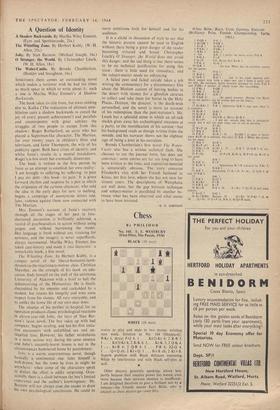A Question of Identity
The Water-Castle. By Brenda Chamberlain. (Hodder and Stoughton, 16s.)
SOMETIMES there conies an outstanding novel which makes a reviewer wish he had ten times as much space in which to write about it: such a one is Martha Wiley Emmett's A Shadow Backwards.
The book takes its title from, but owes nothing else to, Kafka (The realisation of ultimate anni- hilation casts a shadow backwards to cancel the joy of every present achievement') and parallels and counterpoints with great subtlety the struggles of two people to escape from this shadow: Roger Rutherford, an actor who has played a Superman-like character, The Martian, for over twenty years in children's films and television, and Janie Thompson, the wife of his publicity agent. Both have crises of identity; and whilst Janie's results in a mental breakdown, Roger's is less overt but eventually disastrous. The book is written in the first person by Janie as an attempt to establish her own reality: 'I am brought to suffering by suffering; in pain 1 pay my debt—this book—to pain.' It is given forward rhythm and suspense by a plot in which the originator of the cartoon character, who sold the idea in the early days for next to nothing, begins a campaign of anonymous letters and, later, violence against those now connected with The Martian.
Mrs. Emmett's account of Janie's recovery through all the stages of her past in fore- shortened succession is brilliantly achieved, a record of. psychoanalysis in action without using jargon and without harrowing the reader. Her language is fresh without any straining for newness, and the imagery is never superfluou's, always incremental. Martha Wiley Emmett.has taken case-history and made it into literature: a remarkable book, a tine novel.
The Whistling Zone, by Herbert Kubly, is a campus novel of the liberal-humanist-lamb- thrown-to-the-reactionary-wolves class. Christian Mawther, on the strength of his book on edu- cation, finds himself on the staff of the enormous University of Alakomo with a brief to halt the dehumanising of the Humanities. He is finally discredited by his enemies and cuckolded by a student, but retains his integrity and wins some respect from his classes. All very enjoyable, and so unlike the home life of our own dear dons.
The absence of his mother in hospital for an operation produces classic psychological reactions in eleven-year-old Joby, the hero of Stan Bar- stow's latest novel. The boy takes up with bad company, begins stealing, and has his first tenta- tive encounters with unfulfilled sex and un- requited love. However, his father misbehaves in a more serious way during the same absence and Joby's sincerely-learnt, lesson is not in the circumstances hammered home by punishMent.
Joby is a warm, unpretentious novel, though basically 'a sentimental one. Joby himself is well-drawn, but the town he lives in might be anywhere: when some of the characters speak in dialect the effect is oddly surprising. Occa- sionally there is a clash between the boy's limited experience and the author's knowingness: Mr. Barstow will not always trust the reader to draw his own psychological conclusions. He could be
more ambitious both for himself and for his audience.
It is a cliché in discussion of style to say that the historic present cannot be used in English without there being a great danger of the reader becoming irritated and bored. Christopher Leach's 0 Stranger, the World does not avoid this danger, and the sad thing is that there seems to be no technical justification for using this tense: there is little need for immediacy, and the subject-matter needs no enhancing.
A failed poet and failed suicide takes a job writing the commentary for a documentary film about the Moslem custom of leaving bodies in the desert with money for a ghoulish caravan to collect and take them for burial in the Holy Places., Delman, the director, is the death-wish personified, and the novel is more an account of his redemption than the poet-narrator's. Mr. Leach has a splendid scene in which an oil-rich sheikh gives away his archaeological treasures at a party, to the mortification of his curator—but his background reads as though written from the outside, and his narrator shows not the slightest sign of being a poet in his narration.
Brenda Chamberlain's first novel The Water- Castle also has a serious technical fault. She chooses to use the journal form, but does not convince: some entries are far too long to have been written at the time, and exposition-material is unnaturally obvious. The story concerns Elizabeth's visit with her French husband to Klaus, her first love, whom she has not seen for sixteen years. The descriptions of Westphalia are well done, but the gap between technique and subject-matter is paralleled by another be- tween what has been observed and what seems to have been invented.
B. S. JOHNSON


































 Previous page
Previous page